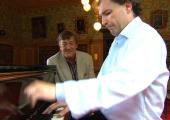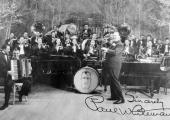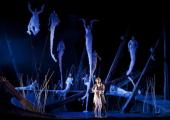A feast fit for the Mastersingers: Wales objects



Watching and hearing this revival of WNO’s now eight-year-old production of Verdi’s Rigoletto, it’s hard to remember he composed it only a year or two before La Traviata, that most psychologically believable of all his operas. In Rigoletto nothing makes sense: the hunchback’s pretty daughter, her apparently willing incarceration, Rigoletto’s hoodwinking (literally) into helping her abduction, her final self-sacrifice – all palpable nonsense. Yet the piece never seriously fails.

Only those who think the burnt-out question of Wagner and the Nazis can still be brought to bear on his operas could be disappointed by Richard Jones's life-enhancing new production. Not a swastika in sight, not a hint of anti-semitic caricature for the fallguy who was never intended for it in the first place, only affirmation of the opera's central message that great art can bring order and understanding to society.


Europe is alive with the sound of music of all kinds through the summer, and here theartsdesk brings you listings of this year's attractions, many of which you can still get tickets for and combine culture with splendid cities and landscapes. From avant-garde dance music at Barcelona's Sonar to deepest Wagner in Bayreuth, this is the unmissable clickable guide to a cultivated European trip.
Europe is alive with the sound of music of all kinds through the summer, and here theartsdesk brings you listings of this year's attractions, many of which you can still get tickets for and combine culture with splendid cities and landscapes. From avant-garde dance music at Barcelona's Sonar to deepest Wagner in Bayreuth, this is the unmissable clickable guide to a cultivated European trip.

Is there anywhere Stephen Fry will not go? I mean in documentaries. We’ve had Fry on depression and Fry on America, Fry on HIV and Fry on endangered species. Movingly, we’ve had Fry on who he thinks he is, an odyssey in which he discovered that much of his family fetched up in the gas ovens. Fry on Wagner? Admit it, you weren’t surprised. You didn't think, not another bloody comedian investigating, in pursuit of ratings, a subject of which he knows next to nothing. Fry, as everyone knows, knows everything.


This month the selection varies from sackbutts to serialism, by way of condensed Wagner, Elgar conducted by the much-missed Vernon Handley and music from both Shostakovich and a disciple of his. Among contemporary music there is Osvaldo Golijov’s lively setting of the Passion story and the young German composer Thomas Larcher and the great Henri Dutilleux. There are also more delights from Swiss master Frank Martin. Violin pyrotechnics are supplied by Ysaÿe. But we begin with vintage Gershwin, and that famous looping clarinet.

